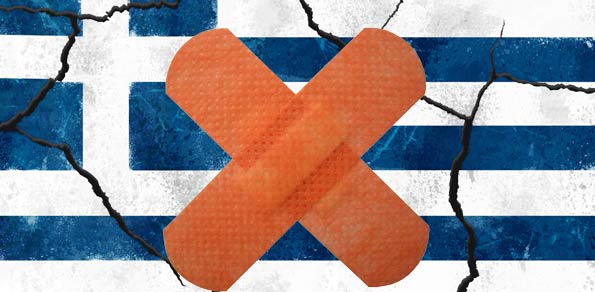A spokesman for the Greek government said this morning that negotiations with its lenders are now focused on three issues; wages, pensions and bank recapitalization. Pantelis Kapsis, when interviewed, told Greek television that there are just a few “sticking points” to be cleared up before the Private Sector Involvement (PSI) is agreed by all parties. The wage question focuses on Greece’s minimum salary of €750 per month, which the IMF argue is too high. Union officials oppose the suggestion, saying a cut would drive more people into poverty and further damage consumer spending (retail sales are already desperate).
Angela Merkel is visiting China for top-level meetings with premier Wen Jiabao and president Hu Jintao. Europe’s fiscal plans will no doubt be discussed, along with China’s policy on the yuan. Merkel’s visit will be closely watched for signs that China might be prepared to offer any support to help Europe through the debt crisis, and for her own views on the situation.
Deutsche Bank
Deutsche Bank AG, Germany’s largest bank, reported a 76 percent drop in fourth-quarter profit as Europe’s sovereign-debt crisis curbed trading and the company booked write-downs on holdings. The shares declined.
Net income fell to 147 million euros from 601 million euros a year earlier, the Frankfurt-based company said today in a statement. Earnings missed the 556 million-euro average estimate of 12 analysts surveyed by Bloomberg. The investment bank had a 422 million-euro pretax loss.
Monti Struggling To Get Italian Parliament And Labour Unions Onside
Italy’s rigid firing rules can hurt economic growth and changing them to make it easier for companies to shed workers can’t be “taboo,” Prime Minister Mario Monti said. Labor Minister Elsa Fornero resumes talks today with union leaders and employers, who remain divided on how to spur hiring in an economy where youth unemployment tops 30 percent. Italy last month passed 20 billion euros ($26 billion) in tax hikes and spending cuts and a package of measures to spur competition and growth, helping push the yield on the country’s 10-year bond to the lowest in almost four months.
Monti said the support of his predecessor, Silvio Berlusconi, is “key” for his government. Monti, who heads a non-elected government and doesn’t lead a political party, said he doesn’t take parliamentary backing for granted and support from parties besides Berlusconi’s is also important, he said.
Market Overview
European shares initially hit a six-week high early on Thursday adding to solid gains after global manufacturing data eased fears over growth outlook. With Greek debt talks unresolved. However, gains were limited and the main European indices are now in negative territory. European stocks erased gains, after yesterday rallying to a six-month high, oil producers fell, offsetting the secular rally in mining companies as Glencore International Plc offered to buy Xstrata Plc.
The Stoxx Europe 600 Index slipped less than 0.1 percent to 259.46 at 9:07 a.m. in London, erasing an earlier gain of as much as 0.4 percent. The gauge yesterday rallied to its highest level since Aug. 1. Futures contracts on the Standard & Poor’s 500 Index expiring in March lost less than 0.1 percent today. The MSCI Asia Pacific Index added 1.2 percent.
Market snapshot at 10:10 am GMT (UK time)
Asia-Pacific markets enjoyed a very positive late night/early morning session. The Nikkei closed up 0.76%, the Hang Seng closed up 2% and the CSI closed up 2.36%. The ASX 200 closed up 1%. European bourse indices are flat or moderately down after reaching near close on six month highs across the board yesterday. This could indicate that technical barriers are now being tested. The STOXX 50 is down 0.15%, the FTSE is down 0.3%, the CAC is down 0.07% and the DAX is currently flat. The Athens index, the ASE, is down 1.47%, down 52.24% year on year.
The SPX equity index future is currently up 1.0%, USA market investors are expecting more positive economic news from the labour market today with the publication of part of the jobs market data.
Forex Spot-Lite
The euro fell versus the dollar and yen as Greece struggled to reach an agreement with bondholders increasing concerns that Europe’s crisis will continue and deepen. The yen was 1 percent from its postwar high versus the dollar, prompting speculation Japan will (once again) intervene in the foreign-exchange market. The shared currency fell against all but two of its 16 major peers after German Chancellor Angela Merkel said Europe must unite to protect the euro. Australia’s dollar touched a five-month high.
[Banner name=”FX School Banner”]






Comments are closed.